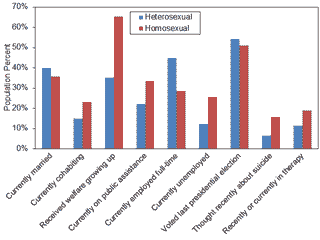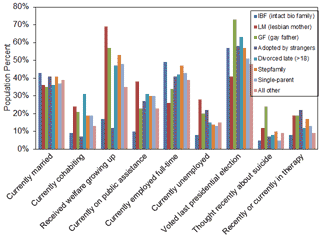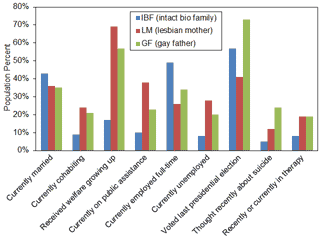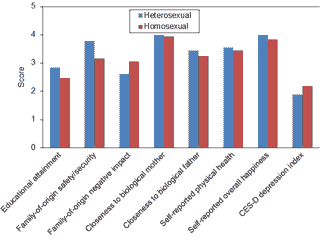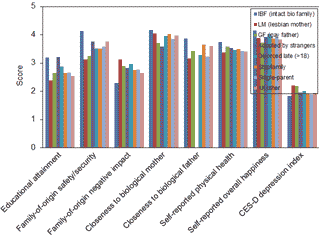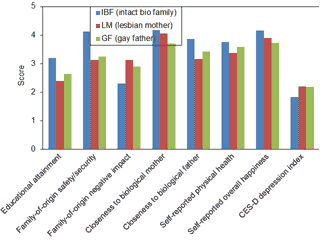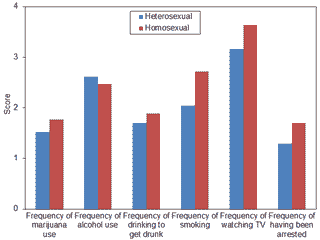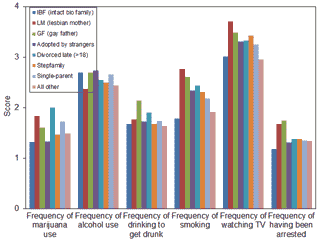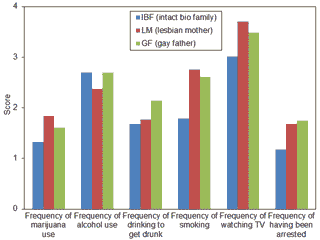Gay Parents Raising Children: The Mark Regnerus Study

Introduction
One of the arguments made by those who oppose gay marriage is that homosexual parenting produces children with social and other deficits compared with children raised by heterosexual parents. Numerous recent studies, authored by gay scientists, have shown that children of gay parents fare identically to children of straight parents.1 However, all of these studies have suffered from the fact that the sampled populations were not randomly selected, largely because few gay parents actually exist. So, investigators have used advertising (mostly online and in gay magazines) in order to recruit enough subjects to study. However, such methods tend to sample a more educated population of subjects compared to randomized sampling. Another deficit of such studies is that the parents themselves have reported the outcomes of their parenting results. Needless to say, no gay parent would want to damage the image of gay parenting.
A new study2 by Mark Regnerus has selected 3,000 study participants randomly by telephone in order to reduce sampling bias. In addition, the participants are the children who report on their respective parents. Although the methods are much better for this study than previous studies, the reporting of the comparisons is what has drawn the ire of many gay groups—and with some justification.
Study comparisons
The thing that has gay groups in such an uproar is how Regnerus has reported his data. His main comparison is between "IBF" ("children lived in intact biological family (with mother and father) from 0 to 18, and parents are still married at present") and children raised by lesbian mothers or gay fathers. These groups were also compared with five other groups; adopted, divorced later (child lived with biological mother and father from birth to age 18, but parents divorced later), stepfamily, single parent, and all others (combinations of the above). Gays were not broken out into such groups, because such a a breakout would have prevented statistical analysis due to small sample sizes. The results from Regnerus's paper "Table 2" are plotted in the figures3 to the right, showing large differences between IBF and gay or lesbian parents ("Table 2 three groups"). The problem with Regnerus's analysis of IBF vs. lesbian mother and gay father is that many of the gays also fall into one of the five other groups, whose children also do not have as a good an outcome as the children of IBF ("Table 2 all groups"). So, in essence, the Regnerus paper is comparing the best heterosexual parents with the average gay parents. What Regnerus didn't do in his paper was to analyze gay vs. straight parents regardless of other factors. However, I have taken his data and plotted it in "All Gay vs. All Straight" (above, right). Comparing average gay vs. straight parents, some of the differences found between IBF and gays tend to disappear (such as being currently married and voted in last presidential election). However, economic factors (such as receiving welfare and holding a job) still stand out as being different.
If one looks at Regnerus's Table 3 data, which mostly examines family
dynamics and happiness, many of the differences disappear when the groups
are combined. While "educational attainment," "family-of-origin
safety/security, and "family-of-origin negative impact" still stand out as
different, "closeness to biological mother," "closeness to biological
father," "self-reported physical health," "self-reported overall happiness,"
and "CES-D depression index" are not significantly different between the
children of gay vs. straight parents (see figures to right).
Likewise, if one examines Regnerus's Table 4 data, which mostly examines negative outcomes among children, differences between gay and straight parents tend to diminish when all groups are combined. For example, the use of of marijuana and alcohol are virtually identical among children of gay and straight parents, although smoking, TV watching, and having been arrested are somewhat higher in the children of gay parents (see figures to right).
Other study outcomes
The one thing the Regnerus study does well is to show how rare gay parenting really is. In this random sampling, gay parents made up only 1.7% of the United States population.2 In addition, the study showed that children raised by gay parents were much more likely to be open to same-sex relationships than those raised by straight parents. For example, only 61% of children of lesbian mothers reported themselves to be "entirely heterosexual" compared to 90% from IBF.2 Likewise, only 71% of children of gay fathers reported themselves to be "entirely heterosexual."2 This data shows that nurture has a large effect on sexual preference and discredits the claim that people are born gay.
Conclusion 
There has been much rhetoric on both sides of the gay marriage issue. One of the claims of those opposed to gay marriage is that gays make poor parents (although marriage is not a legal requirement for being a parent). Although the Regnerus study shows that intact biological families are superior for raising children, it also shows that non-intact families are inferior on average, regardless of the sexual preferences of the parents. When all the data of the Regnerus study are combined into gay vs. straight, many of the differences between the groups tend to disappear, although some deficits still exist for children raised by gay parents. The random selection method of Regnerus is far superior to the biased subject selection methods used in previous studies. However, in order to definitively study children raised through gay parenting, a sample size much larger than 3,000 would be required, if there were to be a comparison of intact biological parents vs. intact gay parents.
Related Pages 
- Are People Born Gay? Genetics and Homosexuality
- Smoking and Alcohol: It's Just Another Lifestyle: What Health Risks?
- Rebuttal to Why the Christian Right is Wrong About Homosexuality
- The Biblical Design for Human Sexuality
- Homosexuality: Issues and Articles
References 
- Crowl, A. L., S. Ahn, and J. Baker. 2008. A
meta-analysis of developmental outcomes for children of same-sex and
heterosexual parents. Journal of GLBT Family Sciences 4: 385–407.
Biblarz, T. J. and J. Stacey. 2010. How does the gender of parents matter? Journal of Marriage and Family 72: 3–22.
Gartrell, N. K. and H. M. W. Bos. 2010. US national longitudinal lesbian family study: psychological adjustment of 17-year-old adolescents. Pediatrics 126: 1–11.
MacCallum, F. and S. Golombok. 2004. Children raised in fatherless families from infancy: a follow-up of children of lesbian and single heterosexual mothers at early adolescence. Journal of Psychology and Psychiatry 45: 1407–1419. - Regnerus, M. 2012. How different are the adult children of parents who have same-sex relationships? Findings from the New Family Structures Study. Social Science Research 41: 752–770.
-
Original and calculated data from Regnerus study

http://www.godandscience.org/doctrine/homosexual_parents_study.html
Last updated June 20, 2012
